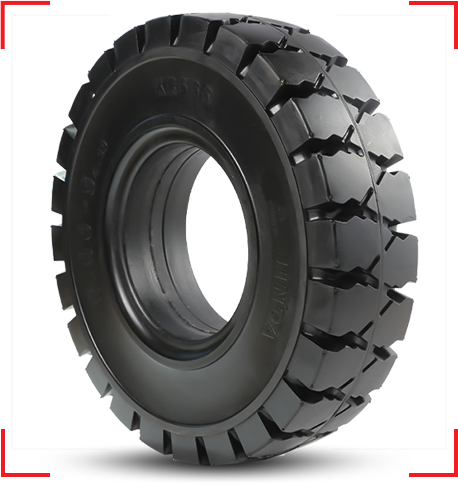1. Elimination of Downtime: One of the primary advantages of solid forklift tires is their puncture-proof design. Unlike pneumatic tires, which are susceptible to punctures and flats, solid tires are resilient and resistant to damage from nails, sharp objects, or rough terrain. This eliminates the downtime associated with tire repairs or replacements, ensuring uninterrupted operations and increased productivity.
2. Enhanced Stability and Load Capacity: Solid forklift tires provide excellent stability and load-bearing capabilities. The solid construction and wide tread design distribute the load evenly, reducing the risk of tire deflection and improving the stability of the forklift. This allows for safer operation, particularly when lifting heavy loads or maneuvering on uneven surfaces.
3. Reduced Maintenance: Solid forklift tires require minimal maintenance compared to pneumatic tires. There is no need for tire inflation or regular pressure checks, eliminating the risk of underinflation or overinflation issues. Solid tires are resistant to wear and tear, resulting in longer service life and reduced maintenance costs.
4. Suitable for Rough Terrain: Solid forklift tires excel in applications that involve rough terrain, outdoor environments, or construction sites. Their robust construction and durability make them well-suited for handling uneven surfaces, gravel, and debris. They provide excellent traction and stability, allowing forklift operators to navigate challenging terrain with ease.
5. Suitable for Heavy-Duty Applications: Solid forklift tires are particularly advantageous for heavy-duty material handling operations. Their solid construction and load-bearing capacity make them ideal for lifting and moving heavy loads. They can withstand higher load capacities compared to pneumatic or cushion tires, ensuring reliable performance in demanding industrial environments.
Considerations for Solid Forklift Tires:
1. Ride Comfort: Solid forklift tires are generally stiffer than pneumatic or cushion tires, which can result in a rougher ride. The absence of air-filled cushioning affects operator comfort, especially when operating forklifts for extended periods or on uneven surfaces. However, advancements in tire design and the use of specialized compounds have improved the ride comfort of solid tires.
2. Limited Shock Absorption: Solid forklift tires provide limited shock absorption compared to pneumatic tires. Pneumatic tires have air-filled chambers that act as natural shock absorbers, cushioning the forklift and its load from bumps and vibrations. Solid tires, on the other hand, transmit more shock and vibration to the forklift and its components. This can impact operator comfort and potentially lead to increased wear on the forklift itself.
3. Floor Protection: The solid design of forklift tires means they lack the cushioning effect provided by pneumatic tires. This can result in increased impact and stress on warehouse floors or delicate surfaces. In certain applications, such as indoor operations or areas with sensitive flooring, additional precautions or floor protection measures may be necessary to prevent damage caused by solid forklift tires.
4. Noise Levels: Solid forklift tires tend to produce more noise compared to pneumatic or cushion tires. The solid rubber or polyurethane compounds come into direct contact with the ground, resulting in increased noise levels during operation. This can be a consideration in noise-sensitive environments, such as indoor facilities or residential areas.




 Français
Français
 عربى
عربى
 Español
Español















